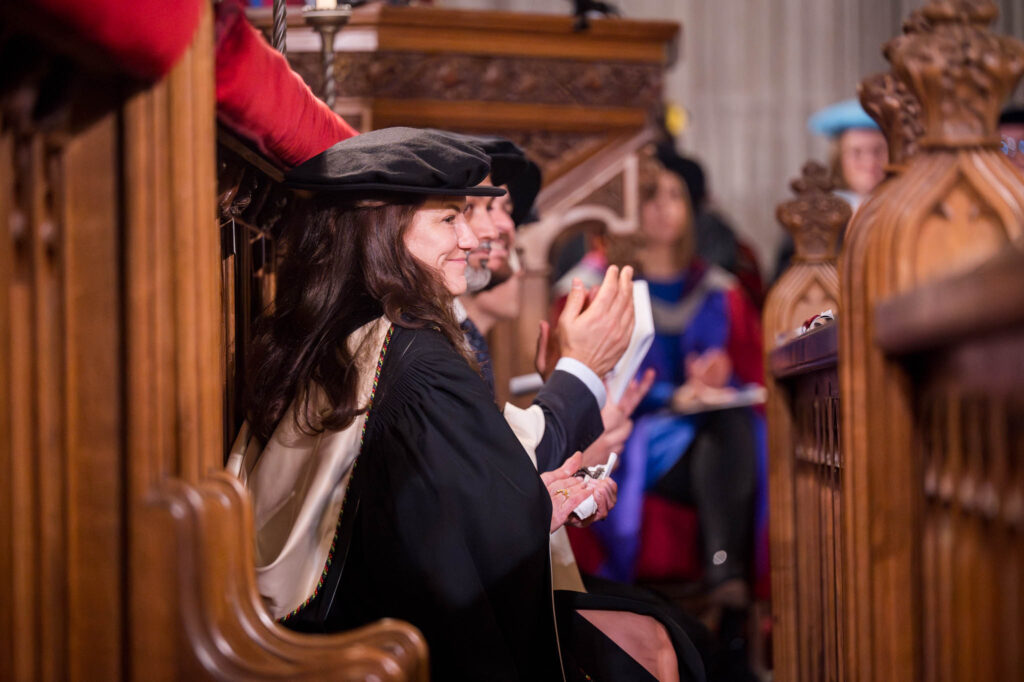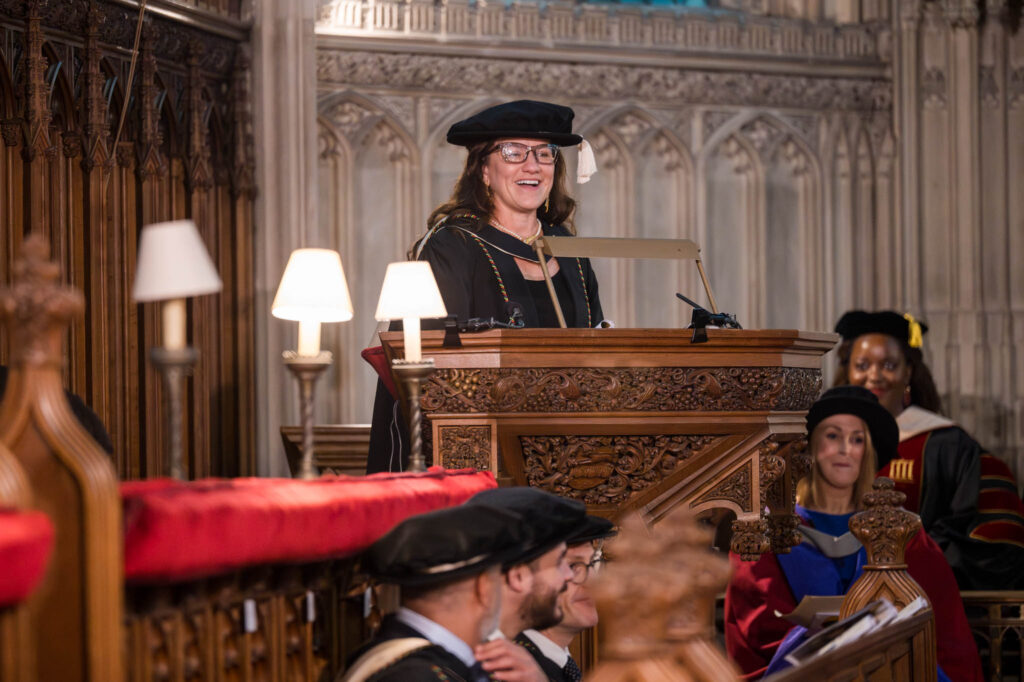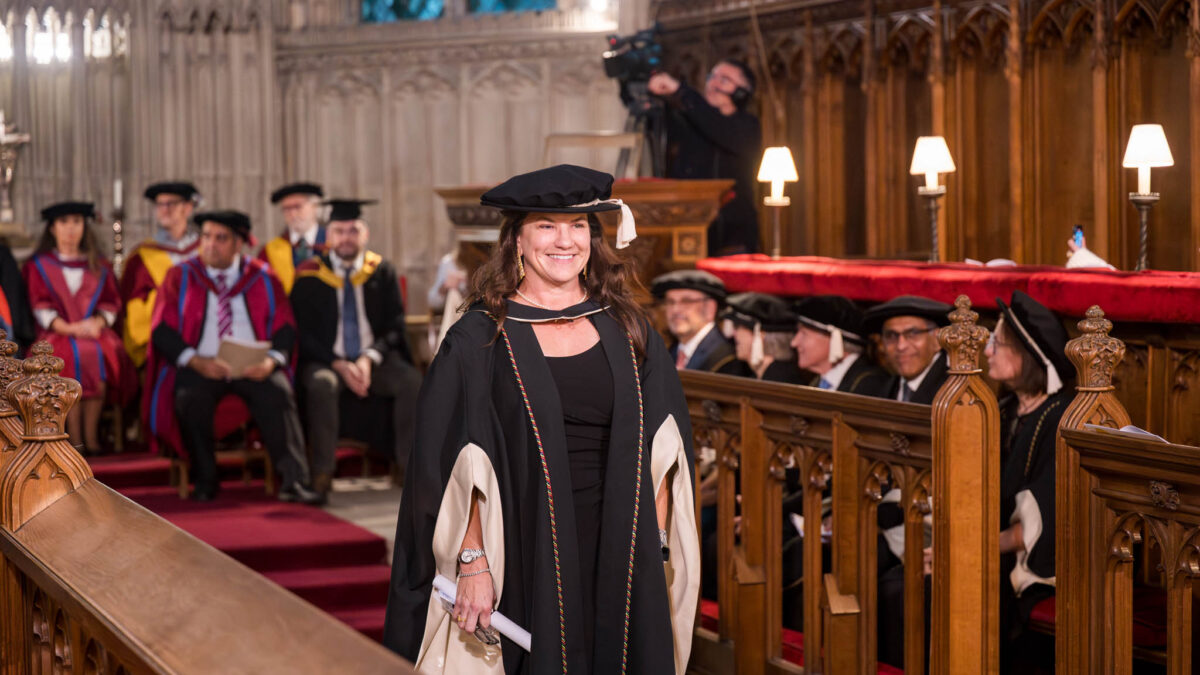One Year After My Doctorate Graduation: Reflections from DBA Graduate Dr. Steph Sharma
From consultant to scholar practitioner and researcher: One year after graduating, Steph Sharma shares how the DBA reshaped her approach to knowledge, strategy, and inquiry.
What changed for you during the DBA?
The DBA reshaped how I approach knowledge and inquiry. Coming from a consulting career where the aim was to deliver solutions and insight to clients, I had to unlearn the instinct to “prove a point.” Doctoral research is not about delivering an answer on demand, but about asking better questions, testing hypotheses, and accepting results, whether they confirm or disprove assumptions. That shift to becoming a neutral participant in inquiry was fundamental.
The program also made clear that while you form lifelong friendships, doctoral work is deeply individual. Success comes from staying focused on your own goals, seeking the information you need, and contributing to others where possible. I also became acutely aware of the DBA’s “cultural misfit” status in academia. It is often misunderstood compared to the PhD. The challenge for graduates is to establish the DBA’s value through rigorous, consistent research that bridges academia and practice.


One year on, what’s changed since graduation?
The research I began post-graduation brought acute awareness of the dimensionality of academic inquiry to my work. I have always been a data-driven strategy and management consultant, but academic rigor now informs everything I do. Since December 2024, I have developed new conceptual models at the intersection of sustainable strategy, AI, and decision-making in VUCA environments. I have also presented across global conferences, from Sydney to Michigan to Palermo and Porto, sharing frameworks that integrate complexity science, effectuation, and AI.
Perhaps most important, I now collaborate with former professors as peers. Writing with scholars such as Mark Esposito, Yusaf Akbar, Kate Abraham, and Patrick Kincaid has taught me how to lead co-authored work, move projects forward, and meet submission deadlines with publishable quality.
“In consulting, I was praised for solving problems and delivering answers. The DBA taught me that real research is about inquiry, not certainty, and that disproving a hypothesis can be as important as proving one.”
Dr. Steph Sharma, Hult DBA Class of 2024
How has the DBA influenced the way you think or make decisions?
It taught me humility in knowledge creation. Research is rarely about discovering something entirely new. Instead, it is about integrating, reframing, or extending what exists from a new perspective. The DBA instilled rigor to remain impartial and not become attached to concepts or data. This is counter to business practice, where we are trained to identify problems, find solutions, and implement them. In research, disproving a hypothesis can be just as valuable as confirming one. That mindset has changed how I approach strategy questions. I now sit more comfortably in uncertainty, inquiry, and iterative testing, rather than racing to solutions.


What has the DBA helped you achieve that you couldn’t before?
The DBA enabled me to step into the academic world with credibility, confidence, and skill. I can now design and deliver research at a level that contributes to both scholarship and practice. I have built conceptual frameworks that I am advancing through publications and teaching, while also consulting with organizations. The degree provided the foundation to contribute as both a researcher and practitioner, which was not possible before.
“What surprised me most was that defending my thesis did not feel like an ending. It was the beginning of an entirely new dimension of my professional life.”
Dr. Steph Sharma, Hult DBA Class of 2024
What’s been your biggest surprise about life after the DBA?
The biggest surprise is the sense of responsibility that comes with creating and extending knowledge. There is a humility required, knowing that your work stands on the shoulders of decades of prior research, and that your role is often to offer integration or reframing, not necessarily invention. At the same time, I have been surprised by how energizing it is to collaborate with colleagues across disciplines and geographies.
When I defended my thesis, I expected a sense of completion. Instead, it felt like a beginning. Within weeks, I was already immersed in new research projects and conference presentations. The DBA did not close a chapter, it opened an entirely new dimension of my professional life.
Steph’s journey is part of our “One Year On” series as we count down to graduation, celebrating our Doctoral graduates from last year who are driving impact and shaping business, policy, and academia.
See yourself becoming a scholar practitioner, applying structured rigorous research to real world problems, and making an impact that matters? Find out more about the Hult DBA on our website.


